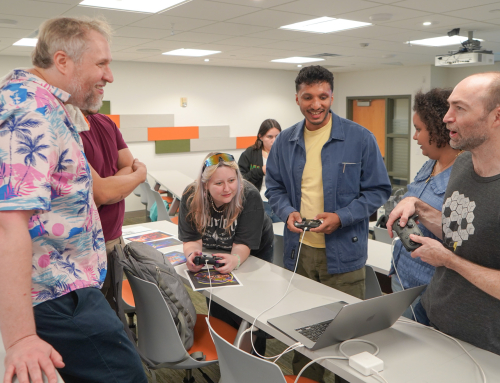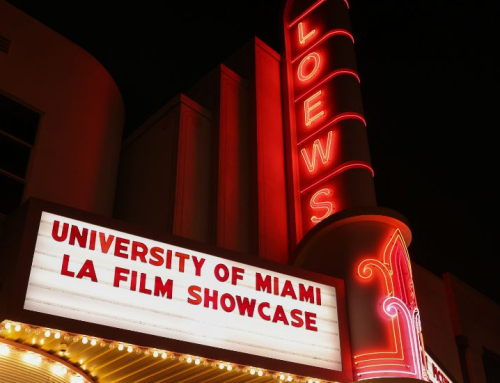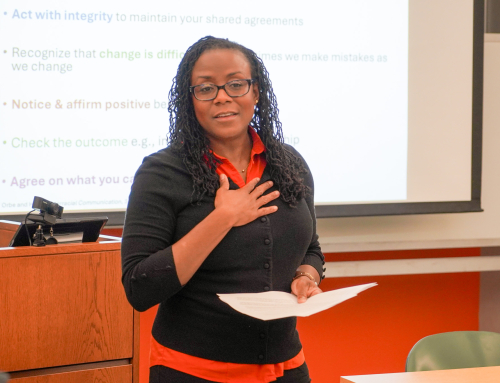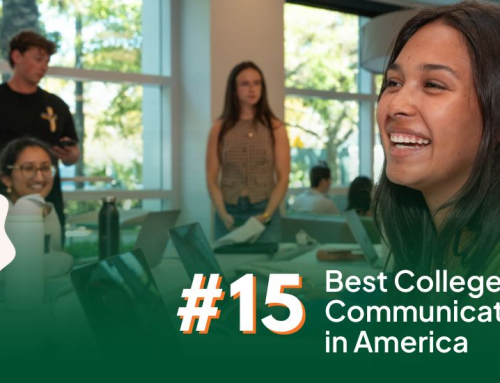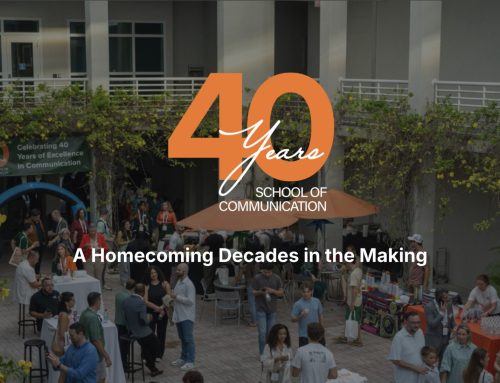The future of the Fourth Estate
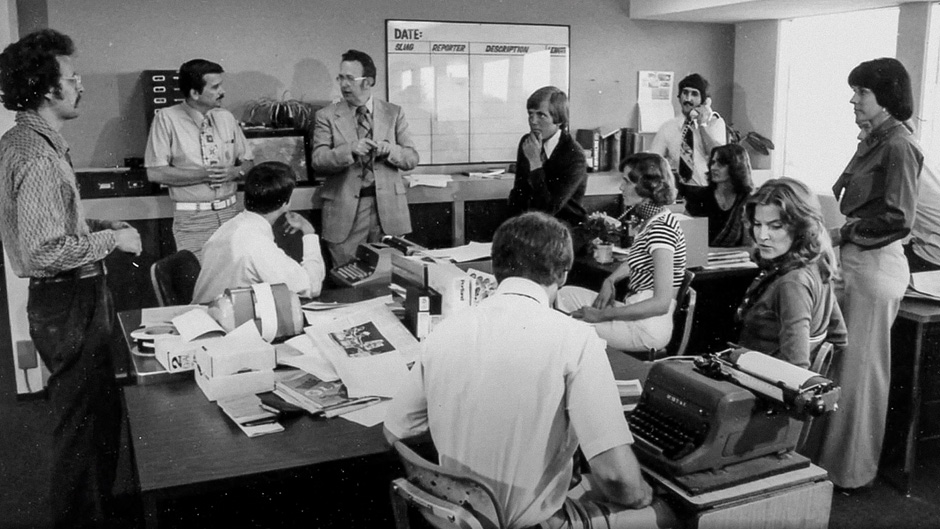
An newroom image from the documentary, “News Without a Newsroom.”
Michael R. Malone
4-8-2025
This story originally appeared in News@TheU.
Though she’s a relatively young filmmaker, Oana Martisca espouses a self-described “old school” mindset about journalism, one that recognizes the difference between professionally trained and values-imbued news-making and the amateurish alternatives.
That mindset is influenced to a large degree by her experience growing up in Romania, a country whose modern history includes nearly two decades of bloody Soviet occupation and then years of dictatorship and repressive authoritarian rule.
“A lot of people come to this country because of the First Amendment and the protections afforded by the freedom of expression, but without journalism, as we make clear in the trailer and the film, we won’t have democracy—journalism and democracy are interdependent,” said Martisca, who is slated to graduate this spring with an M.F.A. in documentary filmmaking from the University of Miami School of Communication.
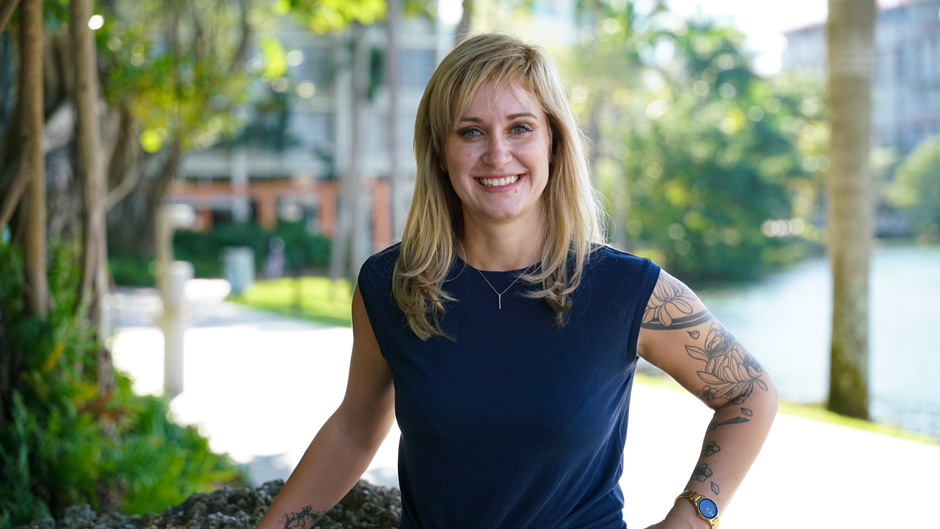
Oana Martisca
“I feel protected by journalists, and so many of the ‘titans’ of journalism that I interviewed for the film did as well. But I don’t know if that’s happening anymore,” she added.
“News Without a Newsroom,” enjoys its world premiere as part of the 42nd Miami Film Festival on April 11 at 6:30 p.m. at the Bill Cosford Cinema. Martisca’s film features insightful conversations with prominent local journalists such as Alberto Ibargüen, Lizette Alvarez, Maggie Steber, Dale Anglin, Sarabeth Berman, Rene Rodriguez, Martin Baron, as well as important organizations like the Knight Foundation, Press Forward, American Journalism Project, Chalkbeat, and many others.
Martisca extended her M.F.A. program when she was awarded a Knight Foundation grant to continue work on the film, and the University offered to serve as fiscal sponsor. She used a portion of the scholarship monies to compensate student musicians at the Frost School of Music who produced the film’s original score.
Prior to being selected for the University’s cinematic arts program, Martisca earned an M.F.A. in creative writing from the University of Roehampton in London, then lived in New York, where she developed a creative career as a painter, a writer, and photojournalist. She moved to Peru where, while exploring rainforest wildlife in the Amazon jungle, she became increasingly motivated to express what she was experiencing through film.
As part of a first-semester project at the University, she crafted a short on the subject locally and then “put it in the drawer” as she moved to other projects and continued to hone her skills as a documentary filmmaker. Later she entered the short into a few film festivals where it won awards.
“I realized that the decline of journalism as a subject was captivating more people than I thought, and the short film was a success even if it wasn’t as professional as I had wanted it to be—I didn’t know the impact it would have,” she said.
Though crafting a feature film is not required for her program, Martisca felt compelled to tell a fuller story.
“I wanted to find out more, connect with organizations, with people who are experts, gather an investigation, and understand the reasons for the bigger, systemic problem that this is happening in the United States,” Martisca said. “I tried to address some of that journey from the ‘golden age of journalism’ moving into the present-day crisis and looking at the future, the uncertainty, and the future of journalism.
“The voices I spoke with are not just sources or mentors or storytellers; these people are torchbearers of a profession that is undergoing severe shifts. I have done work as an investigative reporter, and I just felt that it was necessary to highlight that without the institution of journalism, democracy disappears.”
The demolition of the Miami Herald building in downtown Miami in 2015—and the vast vacant lot that was left afterward—served as a visual imprint for the film’s focus.
“More than even the disappearance of the actual building, having that space where people could connect and develop mentorships and relationships with each other was lost,” she said. “COVID has impacted all of us and especially journalists, prompting more remote work, but it’s essential to grow in a space where you can go from desk to desk, door to door, and, through that water cooler or elevator effect, have ideas spark from those interactions.”
Much as journalism needed to adapt to the advent of the internet, artificial intelligence poses as the next disruptor, and journalists and journalism must adapt to regain trust and rehabilitate the critical role that it plays in a democratic society, Martisca emphasized.
“Those headlines of when the Beatles happened, J.F.K. was assassinated, landing on the moon—they’re all part of our collective consciousness,” she said. “Without journalism as we know it, truth is disappearing. We’re dealing with a lot of misinformation and technological changes, and journalists need to adapt, or they will become extinct.”
Crafting a film such as “News” is an outcome of her passion and drive.
“As a filmmaker, it’s in my mission to not just create content, because content can be devoid of meaning, but to create a story that has a mission, that is meaningful, and that is relatable on a personal level,” she said.
“For us who are in the field, a lot of what you see in the film doesn’t come as a surprise, but a lot of people are blinded—they don’t see what is happening,” Martisca said. “They need to go through that transition to acknowledge the level that our society is being impacted by the loss of newspapers. Just bringing that to their consciousness is a first achievement.”


